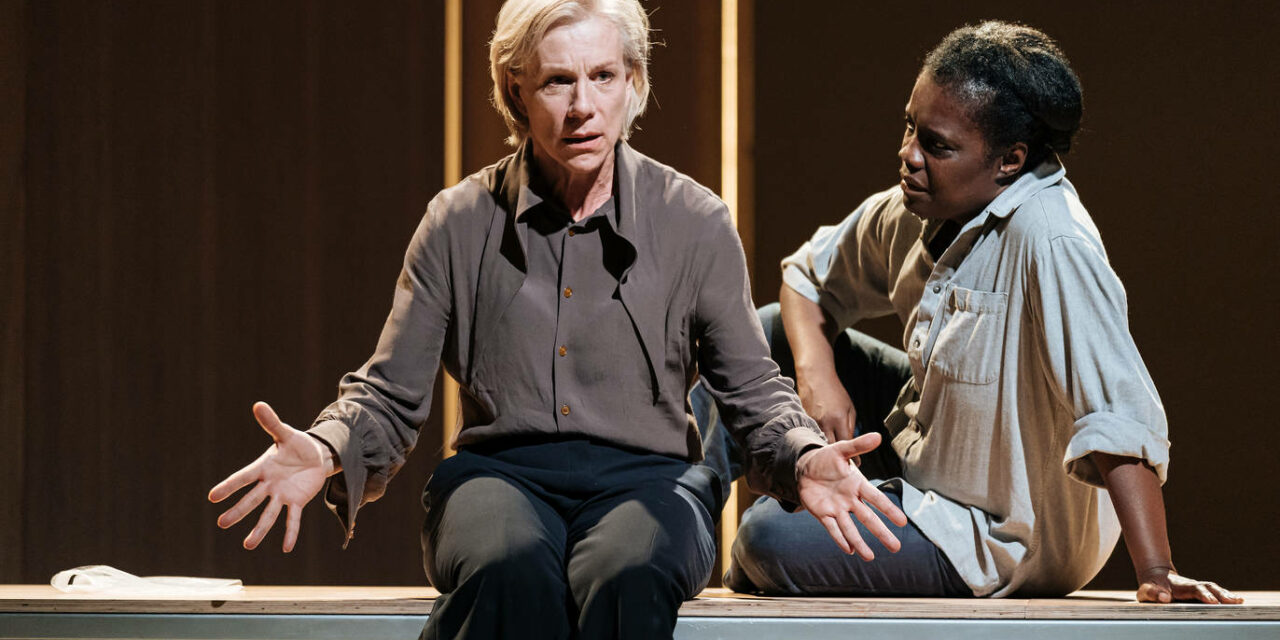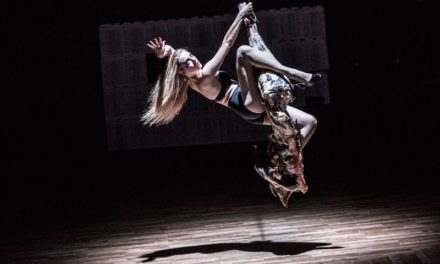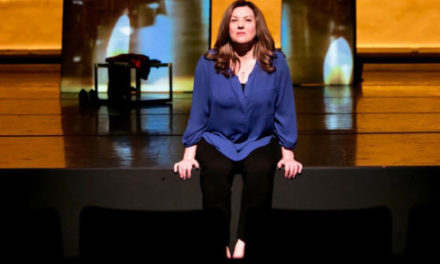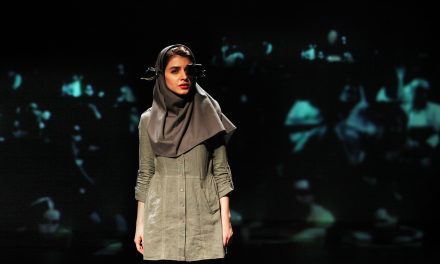“Crystal clear.” The adjective, repeated like a mantra in Robert Icke’s The Doctor, is charged with electricity. On the one hand, it points us to the play’s central matter, a shape-shifting assault of rationalist, transparent principles by societal hermeneutics of suspicion. On the other, it characterizes the very manner in which this feud is being staged. Icke’s “very free” adaptation of Arthur Schnitzler’s 1912 play Professor Bernhardi—his final production as the Almeida Theatre’s Associate Director—is a bitingly intelligent, clinically precise examination of how intersections of discordant ideals can keep them anything but crystal clear.
Icke lights the fuse of this volcanic, scorching play before one knows it. Only after we witness the flow of lava, as it were, do we register the explosive nature of what has transpired: Ruth Wolff, a medical doctor at the top of her field and the founding director of the Elizabeth Institute, is about to lose a patient—the fourteen-year-old Emily who tried to abort herself at home and went into septic shock. At the behest of her parents, who are on a plane, a Catholic priest demands to see Emily before she dies and read her the last rites.
Wolff refuses to grant him the visit, as the girl’s medical notes do not include a request for religious assistance, and her faith remains unknown on paper. The ramifications of the ensuing verbal altercation between Wolff (later revealed to be Jewish) and the priest (later revealed to be Black) is what The Doctor chronicles and dissects with disturbing care. In just a few days, the storm in the teacup spills out, engulfing Wolff in an exacting test of her principles as a doctor.
What at first appears to be an inquisitive play about medical ethics—medicine versus religion, patient choice versus filial obligation—morphs imperceptibly into an even subtler meditation on identity politics, language, and mortality (or, “how best to die”). So wide is the array of questions Icke puts pressure on, that it all may seem too much for a single play to contain. Yet so tight and clean are his ligaments that the cascade of events acquires an aura of inevitability reminiscent of Greek tragedies. As the grinding teeth of institutional dynamics among Wolff’s colleagues—all too aware of their optics of race, gender, and religion—allow the episode to devolve into a digital-age crisis, the growing backlash culminates in a televised debate that is as humorous as it is incisive.
These formal and informal debates, glistening with Shavian edge and wit, do more to reveal the complex constitution of many of the characters than to divide them into camps of right and wrong. What’s more, they find a titillating equipoise between these clashing perspectives, making it harder for us to side with characters uncompromisingly. It feels as though the intellectual ground shifts frequently beneath our feet, but never with the violent tremors of an earthquake. Rather, The Doctor is a patiently exhilarating sweep, fast-paced but rarely tremulous. And capping a slightly heavy-handed and drawn-out final scene, an ingenious epilogue pulls a theatrical trick of haunting resonance.
As the Elizabeth Institute’s “Big Bad” Wolff, Juliet Stevenson delivers a mesmeric, unfailingly intricate performance, registering the changes of her character with minuscule and therefore all the more persuasive signs. Facial twitches, restless eyes, shaking hands: it is mostly through these that Stevenson conveys Wolff’s incremental unraveling. Wolff’s obsession with crystal-clarity in everything—daily speech, medical practice, argumentative stance—finds its foundation in Stevenson’s own precision in the ways in which she develops the character.
She receives indispensable support from a glowing ensemble, most notably Pamela Nomvete, Naomi Wirthner, and Ria Zmitrowicz. As they inhabit Hildegard Bechtler’s spare, purposefully nondescript set in a meticulously disorganized manner, the actors exude the confidence of a society intent on purging itself through a long-awaited witch-hunt. That the actors’ racial and gender identities are intentionally discordant with those of some of their characters feeds into our evolving sense of how a single word (as it serves to designate identity) may turn the tables. “The idea,” Icke writes in a note to the script, “is that the audience are made to re-consider the characters (and events) as they learn more about who the characters are.” That, but also we are made sensitive to how and when these characters decide to display their identity markers as badges, as flags they flaunt in an attempt to prove a point or shut down an opponent.
What gets often sidelined in critical accounts of Icke’s work is his dazzlingly strong writing. He has made a formidable name for himself by re-writing classics in radical and often deconstructive ways, and his fine ear for contemporary speech had shone brightly in his previous productions. But his crisp, profoundly clear language ascends to a whole new level in The Doctor, where the rhythmic thrust of the dialogue blends in with the percussive accompaniment of live music and fuels the characters’ acrid back-and-forths.
Fittingly, he has labeled this play not as a “new” adaptation, but as a “very free” one. (As if some of his previous work were not “very freely” adapted, either.) The humorous candor of this belated acknowledgment illuminates what is definitely a sign that Icke’s writing, following up on his directing, has entered its mature phase. The Doctor’s relentless preoccupation with language as a problematic—its performative power, its evasions, its deceptions—has more than a reflexive tinge to it. The question of who owns a given language, of who acts as a guardian to its rules, predominates the work, and Icke can be said to have asserted with this play his ownership of a particular dramatic speech: one with glossy sharpness and hard-hitting lucidity.
As is occasionally the case with Icke’s productions, the marketing copy for The Doctor includes a list of dictionary entries. We are asked to be attentive to the meaning of “doctor” as a verb: “to treat so as to alter the appearance or character of; to falsify, tamper with, disguise.” It is nearly impossible to read this without an awareness of Icke’s trademark doctoring of others’ plays, both as a writer and as a director. He does, in fact, amiably tamper with these works he absorbs into this oeuvre, disguising some of their aspects, altering others beyond recognition. But what The Doctor makes undeniably clear is that this signature act of veiling is also one of unveiling, of exuberant revelation. There is much balm to be found in Dr. Icke’s imagination: in a world infected with intolerance, misunderstanding, and lack of empathy, one would be wise to turn to him, to The Doctor, for some remedy.
This post was written by the author in their personal capacity.The opinions expressed in this article are the author’s own and do not reflect the view of The Theatre Times, their staff or collaborators.
This post was written by Mert Dilek.
The views expressed here belong to the author and do not necessarily reflect our views and opinions.


















